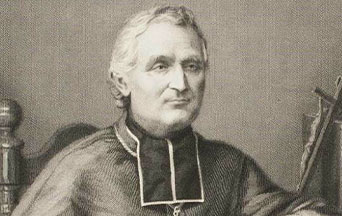
As Minister of Public Instruction, Frédéric Alfred Pierre, Count de Falloux showed the full measure of his political value. Alexis de Tocqueville was utterly indifferent to de Falloux’s ideological orientation. Émile Oliver openly disliked him. Yet, sboth men were profoundly impressed by his abilities. De Tocqueville stated: “Whoever has not seen de Falloux argue at a table does not know what a man’s power is.” Oliver opined, “Falloux is one of those politicians who, from some standpoints, have given me the least imperfect idea of a statesman.”
He used all that ability to liquidate the Catholic Party and replace it with liberal Catholicism.
The Catholic Party was anti-liberal by conviction. It originated and developed amid the struggles of the French Revolution and Napoleon. It prevented liberal propaganda from taking hold in Catholic circles and spreading a spirit of accommodation with the world. Therefore, France’s “liberal” Catholics had to undo the impression the Party’s outspoken and courageous Catholicism had made on the public.
The Count de Montalembert, the undisputed leader of Catholics, was a stumbling block to liberals. Therefore, he had to be removed. The government offered him the London embassy, but England’s Prime Minister, Lord Palmerston, refused to accept him. The Count de Falloux, Father Dupanloup, and several others began to engage the great leader with arguments that the socialist danger required reaching an agreement with the University system on teaching matters.
 Learn All About the Prophecies of Our Lady of Good Success About Our Times
Learn All About the Prophecies of Our Lady of Good Success About Our Times
Many years later, Count de Falloux published a pamphlet on the history of the Catholic Party. In it, he cited the reasons that led him to agree. He wrote, “To save a nation, it is not enough for the education of elite families to be irreproachable from the religious point of view. Education in all things legitimate must also be according to man’s social milieu as he leaves youth. Let us prevent him from being ashamed of his masters or tempted to blame them for his inferiority in the forum, army, or any other career. Educating nineteenth-century young men as if they were to enter the society of Gregory VII or Saint Louis on leaving school would be as infantile as training our young Saint Cyr to use a battering ram or catapult while concealing from them the usage of gunpowder and cannon.”
This passage shows that Count de Falloux never wanted genuine Catholic universities to emerge. In this, he clashed with one of the fundamental points of the Montalembert party’s program. Soon after being named a Minister, he appointed a commission to prepare a law on the freedom of teaching. The criteria he employed to draft it aptly reveal the path he wanted to follow. Adolphe Thiers chaired the 24-member commission in the Minister’s absence. Victor Cousin, Saint-Marc Girardin and others were chosen to represent the University. Montalembert, Father Dupanloup, Father Sibour, the Viscount of Melun, Augustin Cochin, and a few others represented Catholics. To counterbalance the two tendencies, they picked politicians such as Thiers and Eugène Janvier.
Of all the genuine Catholics called to participate in the debates, only Montalembert was among the leaders of the Catholic Party. The editor, Louis Veuillot, was cast aside as “intransigent.” The Party’s ecclesiastical leader, the Most Rev. Pierre-Louis Parisis, Bishop of Langres, was not invited because his presence would hinder Father Dupanloup. The brilliant Catholic archeologist Charles Lenormant, dismissed from the University because of his fidelity to the Catholic Party, did not even get an explanation on why they would not invite him.
Eternal and Natural Law: The Foundation of Morals and Law
From the outset, Thiers dominated the deliberations. In a spectacular change of direction, he proposed that all primary education be placed in Catholic hands and that normal schools, breeding grounds for socialist teachers, be abolished. Next, for the first and last time, Montalembert spoke in the commission on behalf of Catholics. He voiced his opposition to Thiers’ draft, arguing for the traditional Catholic position—freedom of teaching.
Victor Cousin reminded Thiers that all his arguments against the monopoly of primary education were also valid for secondary education. Thiers replied, “Then, we will sacrifice that too; one must sacrifice everything for the salvation of society.” Montalembert did not dare to intervene again. He left the floor to Father Dupanloup, who proposed making an agreement with the University System just as it seemed entirely defeated by the Catholics! Thiers stood up during his exposition and began supporting the speaker with nodding and other gestures. When Father Dupanloup finished, all eyes turned to Montalembert. Forced to speak out, he said only, “I have nothing to add to Father Dupanloup’s words.” The great Catholic leader was finished. Father Dupanloup took the baton of command from him, settling the agreement.
Science Confirms: Angels Took the House of Our Lady of Nazareth to Loreto
The bill’s initial draft entrusted the moral direction of primary education to the clergy. It proclaimed secondary education to be free and reduced the requirements to establish colleges, which no longer needed University approval but only supervision. The ministers of different religions would be responsible for moral guidance and religious teaching in secondary schools. The University system lost control of instruction. Alongside professors, academia’s Higher Council would have magistrates, State councilors, Institute members and three bishops appointed by the episcopate.
The projected bill was profoundly contrary to the Catholic Party’s orientation. Instead of giving the Church freedom to found its own universities, it gave her a very modest place on the University system’s Board of Governors. Even if one supposes the draft contained some good points, it is strange that Catholics agreed to such modest proposals instead of promoting vital Church interests.
At any rate, Montalembert lost the leadership of the Catholic movement. If Catholics supported the projected bill, Count de Falloux and Father Dupanloup would be their new leaders. Liberal Catholicism would be victorious in France.

